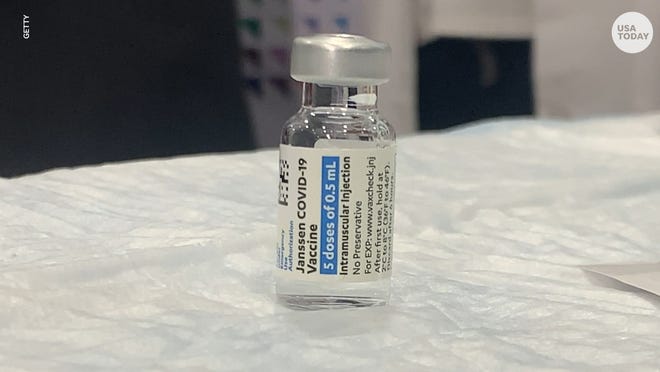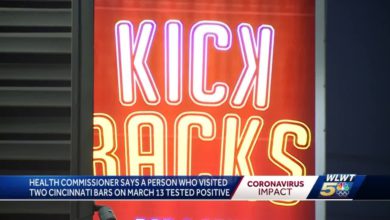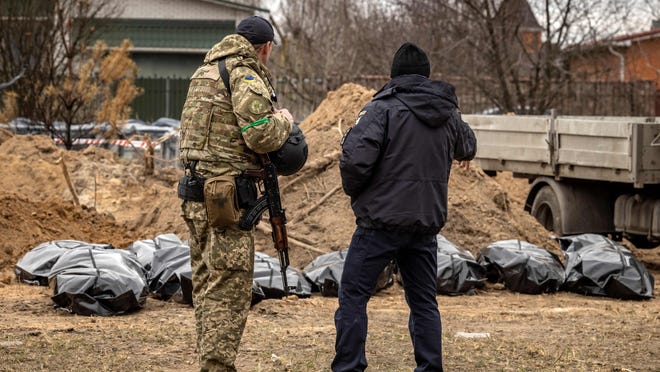
A pause on the use of the Johnson & Johnson COVID-19 vaccine should continue until more is known about a rare vaccine side effect, a federal advisory committee decided Wednesday.
The committee will meet again within a week to ten days to evaluate more data that is expected to become available.
Six women in recent weeks, as well as one man in an earlier clinical trial, developed a rare combination of blood clots and low platelet counts within two weeks of receiving the J&J vaccine. An eighth case with similar symptoms is under investigation.
The Advisory Committee on Immunization Practices of the Centers for Disease Control and Prevention met Wednesday to discuss the cases.
On Tuesday the Food and Drug Administration and the CDC recommended a pause in administering the vaccine after reports of blood clots in a small number of people who received it.
The extremely rare blood clots have been reported in seven of the 7.2 million Americans who have gotten the J&J vaccine. The recent six cases were reported in women ages 18 to 48, and symptoms occurred six to 13 days after vaccination. One woman died and three remained hospitalized.
Some committee members expressed concern the pause might harm those most in need of the vaccine J&J only requires on shot and is easier to store and transport than the other two authorized vaccines.
“Any extension of the pause will invariably result in the fact that the most vulnerable individuals in the United States who are prime candidates for the Janssen/Johnson and Johnson vaccine will remain vulnerable. The most at risk will remain at risk, and those who would benefit immediately from vaccination who will remain unvaccinated for an unknown period of time,” said Dr. Nirav Shah, director of the Maine Center for Disease Control and Prevention.
The ACIP committee is an independent expert group that reports to the CDC. It can only make recommendations and does not regulate drugs, but its advice is generally considered a gold standard by the agencies, and by other nations.
About 3.4 million doses of the J&J vaccine were distributed prior to March 30, while 3.7 million were distributed from March 30 to April 13. That means if the problem is ongoing, an equal or higher number of cases may become apparent in the next two weeks, giving the FDA and CDC a better sense of the risk.
The committee noted continuing the pause would not significantly affect the ability to vaccinate Americans. Two other vaccines, which have not seen such adverse events, are authorized for use in the U.S. The J&J vaccine so far makes up less than 5% of shots administered in the United States.
The experts emphasized the side effect seen in the cases was very specific and exceedingly rare. It involved a combination of blood clots near the brain with a low platelet count. All who were tested also had an unusual antibody to platelets in their blood.
This specific combination of blood clots and low platelets also has been observed after use of the AstraZeneca vaccine in Europe. However, this combination of blood clots and low platelets is so rare that experts were unable to estimate how often it might occur in the gpopulation.
The cases were reported to the CDC's Vaccine Adverse Event Reporting System known as VAERS, which the CDC and FDA co-manage. It serves as an early warning system to monitor the safety of vaccines.
The system worked very well, quickly identifying evidence of the very rare complications within a month of the vaccine being authorized.
One of the reasons for the pause was to alert health care professionals to the possibility of the rare blood clotting problems so they can be properly treated and reported to CDC.
ACIP consists of 15 voting-member experts who are primarily responsible for vaccine recommendations. The secretary of the U.S. Department of Health and Human Services selects the committee through an application and nomination process.
Fourteen have expertise in vaccinology, immunology, pediatrics, internal medicine, nursing, family medicine, virology, public health, infectious diseases or preventive medicine. One member is a consumer advocate to provide perspective on the social and community aspects of vaccination.
In addition to the voting members, there are 30 non-voting representatives from professional organizations that are highly regarded in the health field. They comment on ACIP’s recommendations and offer the perspectives of groups that will implement the recommendations.

Source link








